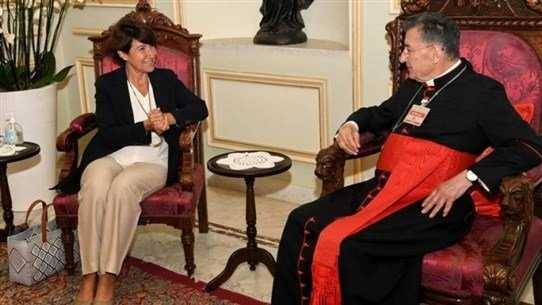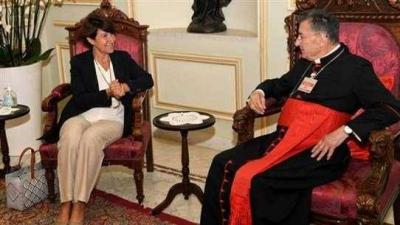Patriarch Bechara Raï does not hide his plea to friendly nations for assistance in pushing for the election of a president for the republic. This may not be the only reason that recently encouraged France's Ambassador to Lebanon, Anne Grillo, to discuss the issue with the Patriarch. The latter has been advocating for months for the election of a president at the beginning of the constitutional period and has consistently outlined the qualities he deems essential, which almost align with France's vision for that president.
Thus, with high diplomacy, Grillo led the conversation to emphasize the richness of the Maronite community in competent figures for the position. She mentioned, as examples, four names she trusts for their integrity, seriousness, patriotism, and ability to assume the desired role: Sleiman Michel Edde, Jihad Azour, Samir Assaf, and Ziyad Baroud.
**Patriarch's Concern**
Raï only commented in generalities, showing respect for the mentioned figures. According to informed sources, "the Patriarch is concerned with the names as far as they match the specifications he sees in the interest of Lebanon. Beyond that, it is up to the Parliament and the deputies to carry out their duties." However, those who visit Diman these days know that the Patriarch's "concern," and the unified question he poses to his visitors, relates to the presidency, the circulating names, the possibility of national consensus around them, and the necessity to adhere to its constitutional date. He raised this issue during the recent visit of the head of the Lebanese Forces Party, Samir Geagea, asking him about his presidential candidate.
Informed sources from Diman confirm that "Geagea reiterated to the Patriarch what he publicly stated about his readiness to support a consensus president, provided they are not from the line of resistance and that they uphold Lebanon's sovereignty first." The Patriarch's perspective does not differ significantly from this proposition. He told Geagea that his position of not running and his readiness to elect a neutral candidate agreed upon by most Lebanese is among the key reasons he is demanding a consensus president who unites rather than divides.
**Criticism of the Patriarch**
However, this demand and the characteristics defined by Raï have annoyed many, especially among the "strong" figures, and have led dozens of Maronites to live the "dream of presidency." One of the frequent visitors to Diman relayed that former MP Sleiman Frangieh criticized the Patriarch for his stance, stating that he possesses many winning cards internally and externally that qualify him to reach the position. Consequently, the Patriarch's position undermines his chances and may result in a candidate who is "colorless and lackluster."
Similarly, the Patriarch's remarks did not sit well with MP Gibran Bassil. However, he tries to maintain an acceptable relationship with Bkerki. Bassil knows that his presidential chances are almost non-existent, but he does not want to burn all his cards in hopes of becoming the largest voter. Yet, the positions of Bkerki complicate his situation.
**Surge of Names**
After Bkerki implicitly excluded the "strong" candidates and set specific criteria, the dream of the presidency began to haunt many Maronites. Some find themselves at a crossroads with other forces that might allow them to build bridges toward the presidency, like former Minister Marwan Charbel, Nagy Bustani, Nassif Hitti, Ibrahim Kanaan, and others. Enthusiasm has also sparked individuals like Ziyad Hayek, who informed a number of his friends via WhatsApp of his intention to run "so they wouldn't hear about it from anyone else."
Other names are being seriously circulated as potential candidates, including MPs or figures close to Bkerki. Most of these individuals are observing and anticipating the right circumstances, calculating their steps to navigate the treacherous paths of the presidential battle marked by rivalries and competition. Among these individuals, including MPs, many work quietly and maintain a good relationship with Bkerki while waiting for conditions to develop. Here, dozens of aspiring names could potentially emerge, from which a president might be chosen or withdrawn from the race between now and the expected date.




